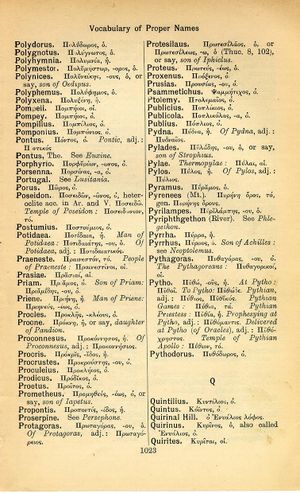Pyramus
καλῶς γέ μου τὸν υἱὸν ὦ Στιλβωνίδη εὑρὼν ἀπιόντ' ἀπὸ γυμνασίου λελουμένον οὐκ ἔκυσας, οὐ προσεῖπας, οὐ προσηγάγου, οὐκ ὠρχιπέδισας, ὢν ἐμοὶ πατρικὸς φίλος → Ah! Is this well done, Stilbonides? You met my son coming from the bath after the gymnasium and you neither spoke to him, nor kissed him, nor took him with you, nor ever once felt his balls. Would anyone call you an old friend of mine?
English > Greek (Woodhouse)
Πύραμος, ὁ.
Latin > English (Lewis & Short)
Pȳrămus: i, m., = Πύραμος,>
I a river in Cilicia, now the Jaihān, Mel. 1, 13, 1; Plin. 5, 27, 22, § 91; Cic. Fam. 3, 1, 1; Curt. 3, 4, 7; 3, 7, 5.
Pȳrămus: i, m., = Πύραμος,>
I the lover of Thisbe, who, on account of her supposed death, stabbed himself under a mulberry-tree, Ov. M. 4, 55 sq. — Hence,
II Pȳrămĕus, a, um, adj., of or belonging to Pyramus, Pyramian: arbor, i. e. the mulberry-tree, Ser. Samm. 29, 553.
Latin > French (Gaffiot 2016)
Pȳrămus,¹⁴ ī, m. (Πύραμος),
1 Pyrame [jeune Babylonien, amant de Thisbé] : Ov. M. 4, 55

